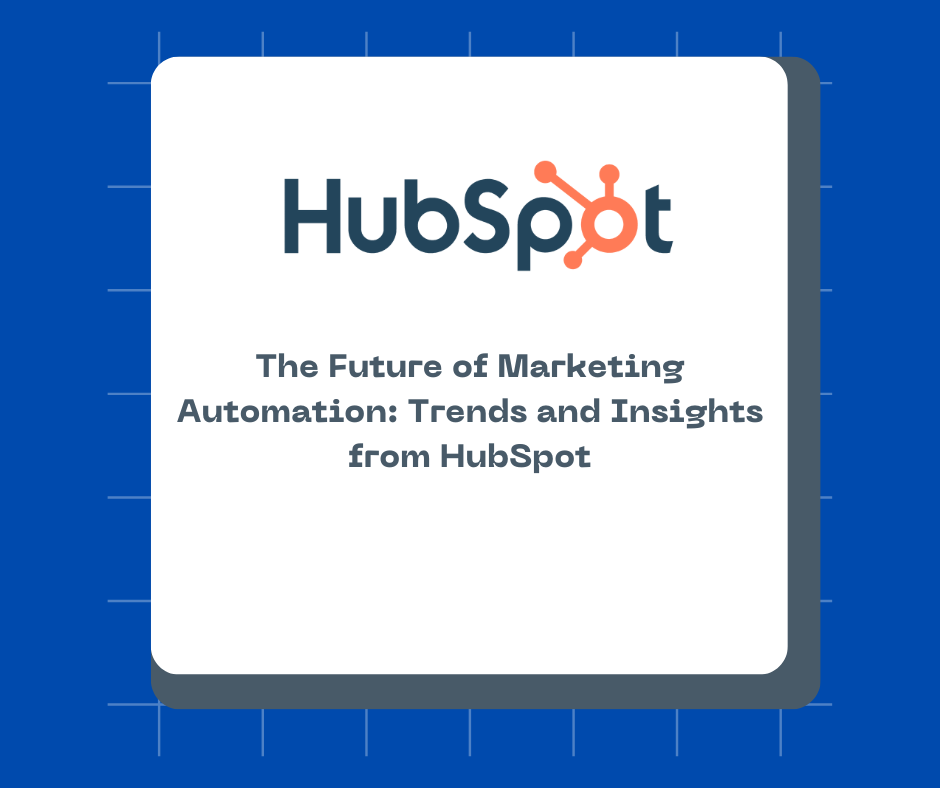In the ever-evolving landscape of digital marketing, staying ahead of the curve is essential for success. Marketing automation has become a cornerstone of modern marketing strategies, and HubSpot, a leader in the field, continues to provide valuable insights into the future of marketing automation. In this article, we'll explore the latest trends and insights from HubSpot to help you navigate the exciting path ahead.
The Evolution of Marketing Automation
Marketing automation has come a long way since its inception. Initially, it was primarily associated with email marketing and basic lead nurturing. However, the scope of marketing automation has expanded significantly. Today, it encompasses a wide range of tools and technologies designed to streamline marketing processes, enhance customer engagement, and drive revenue growth.
HubSpot, a pioneer in inbound marketing and automation, has played a pivotal role in shaping the evolution of marketing automation. Let's dive into the key trends and insights from HubSpot that are shaping the future of this field.
1. Customer-Centric Marketing
One of the fundamental shifts in marketing automation is the focus on customer-centricity. HubSpot emphasizes the importance of building meaningful, long-term relationships with customers. This means tailoring your marketing efforts to address the specific needs and preferences of individual customers.
HubSpot's customer relationship management (CRM) system is at the heart of this approach. It enables businesses to centralize customer data, track interactions, and personalize marketing communications. The future of marketing automation is all about delivering the right message to the right person at the right time, and HubSpot's CRM is a powerful tool for achieving this.
2. Conversational Marketing
Conversational marketing is a trend that's gaining momentum, and HubSpot is at the forefront of this shift. It involves real-time, one-to-one connections between marketers and customers. Live chat, chatbots, and messaging apps are key components of conversational marketing.
HubSpot's Conversations tool allows businesses to engage with website visitors and leads in real time. Whether it's answering questions, providing product recommendations, or scheduling meetings, conversational marketing enables immediate and personalized interactions. This trend reflects the growing preference of customers for instant communication and support.
3. Content Personalization
Content remains a cornerstone of marketing, and HubSpot emphasizes the importance of content personalization. The future of marketing automation involves delivering highly relevant content to each individual prospect or customer. HubSpot's content personalization tools enable marketers to tailor website content, emails, and other assets based on user behavior and preferences.
Personalized content not only increases engagement but also improves conversion rates. HubSpot's insights show that businesses that use content personalization experience higher click-through rates and better customer retention.
4. Multi-Channel Marketing
Marketing automation is no longer limited to email marketing. HubSpot recognizes the need for multi-channel marketing automation, where businesses can automate interactions across various channels such as email, social media, SMS, and more.
HubSpot's marketing automation platform allows businesses to create seamless, multi-channel marketing campaigns. This approach ensures that your message reaches your audience wherever they are most active. The future of marketing automation is about being present on the channels your audience prefers and automating those interactions for efficiency.
5. Artificial Intelligence (AI) and Machine Learning
HubSpot is harnessing the power of AI and machine learning to make marketing automation even more effective. These technologies enable predictive analytics, lead scoring, and personalized recommendations based on user behavior.
HubSpot's use of AI is transforming marketing automation by automating tasks like data analysis, lead qualification, and even content creation. AI-driven chatbots can engage with website visitors and provide assistance 24/7, enhancing customer experiences.
6. Marketing Automation for E-commerce
The e-commerce industry has seen explosive growth, and HubSpot recognizes the unique needs of online retailers. E-commerce businesses can leverage HubSpot's automation tools to streamline their sales processes, personalize product recommendations, and automate abandoned cart recovery emails.
HubSpot's insights indicate that e-commerce companies that implement marketing automation experience significant revenue growth. This trend highlights the role of marketing automation in driving sales and revenue for online retailers.
7. Data Privacy and Compliance
As data privacy regulations like GDPR and CCPA become more stringent, HubSpot emphasizes the importance of compliance in marketing automation. Businesses must ensure that their marketing practices align with these regulations to build trust with customers and avoid legal repercussions.
HubSpot's platform includes features and tools to help businesses stay compliant with data privacy laws. This includes features like opt-in forms, consent tracking, and the ability to manage and protect customer data.
8. Reporting and Analytics
HubSpot places a strong emphasis on data-driven marketing. The platform provides robust reporting and analytics capabilities, allowing businesses to track the performance of their marketing automation efforts.
The future of marketing automation involves using data insights to make informed decisions and optimize marketing strategies. HubSpot's reporting tools enable businesses to measure ROI, track customer journeys, and identify areas for improvement.
Conclusion
The future of marketing automation is dynamic and exciting, with HubSpot leading the way in innovation and insights. Customer-centric marketing, conversational marketing, content personalization, multi-channel automation, AI and machine learning, e-commerce automation, data privacy, and analytics are all key trends shaping the landscape.
By embracing these trends and leveraging HubSpot's automation capabilities, businesses can create more meaningful connections with their customers, drive revenue growth, and stay competitive in the ever-evolving world of digital marketing. As you navigate the future of marketing automation, keep HubSpot's insights and tools in your arsenal to stay ahead of the curve.
Schedule your training session here and comment “Need Training” on the request form.

Comments